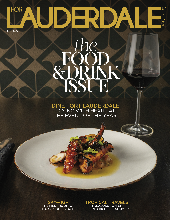There are more options for how to do your banking – on your phone, on your laptop – than ever before. But where to do your banking? That’s a different story. According to a study by the National Community Reinvestment Coalition, about two-thirds of US banking institutions have disappeared since the 1980s – from about 18,000 in 1984 to about 5,000 in 2021, with small banks hit the hardest. The study also found that in-person banking – the ability to walk into a building and speak to a banker – also got a lot harder during the pandemic, as major banks shut branches at a brisk pace.
For a pair of Fort Lauderdale-area banking professionals, the current state of the banking sector represents an opportunity. Along with Keith Costello, Corey LeBlanc and Drew Saito are co-founders of Locality Bank, a community bank headquartered in Fort Lauderdale that aims to offer all the online and app-based services modern banking customers seek while also offering the personal touch many feel they have lost.
“We came together with this idea that community banks need to exist into the future,” LeBlanc says. “The problem is that most community banks are going away, and they’re doing so very quickly.”
The reasons, he says, are varied. Banking has become commoditized. Smaller institutions haven’t tended to build the platforms needed to compete in the new, online world. For LeBlanc and Saito, the goal was to build a bank that uses the new technology but keeps the more old-school relationships.

“What we really set out to do is to build a community bank on a modern platform,” LeBlanc says.
When they talk about community, they’re talking specifically about this one – the plan is for the bank to be headquartered in Fort Lauderdale and strictly serve the tri-county area. And, they note, this is their community.
“We live here,”Saito says of bank leadership. “We moved Corey, so now he’s a Fort Lauderdale transplant.”
It’s almost a cliché of American civic life of yesterday – the bank president or trustee who’s involved in every part of local life. Saito notes that their kids go to school here. They volunteer, go to church and socialize here.
“I was born and raised here in Fort Lauderdale,” he says. It’s special for me that we can launch a digital bank here in Fort Lauderdale.”
Saito also sees it as a selling point for the bank. “Being in-market is very important; with the consolidation happening in our industry, there are a small number of banks that have outsize (influence)” Saito says. He calls it “sustainable banking” – money is all staying in the community.
They get that the words “community bank” might sound dated to some. They’ve got to get people thinking about a local bank built on a digital platform.
“When you hear community bank, you’re thinking of a drive-through with bulletproof glass,” Saito says. Digital banks, meanwhile, can be thought of as just an app with no banker to reach out to when you’ve got a question that requires a personal touch.
“We’re basically bringing the best of both worlds,” Saito says.
Simply put, they believe it’s possible to have both.
“We want to have it to where every single thing you do can be done on … online banking and mobile banking,” LeBlanc says. “But you can come in and have a conversation.
“We think it’s not hard to do both.”

They talk about “high-touch” – a high degree of personal service – as well as high-tech. Sometimes there are moments – taking advantage of a good rate, for example – where an experienced banker is going to get the job done in the way an app cannot.
“We feel like there’s an ethical responsibility … to be high-touch as well,” LeBlanc says. “You can be high-tech, but if you’re not high-touch in banking, you’re putting your customers at a disadvantage.”
At first, they’re going to focus solely on South Florida. They could branch out into more of the state, but only when they know they can put people on the ground who know its various markets.
“We don’t want to dilute our culture and our mission when we grow,” Saito says. “A lot of banks grow and they lose that. We want to make sure we do this in a very methodical way and we’re not sacrificing some of our priorities. Ours is a sustainable model.”
LeBlanc says they’d love to see other banks around the country copy what they’re doing, but they see no need to go national.
“We’re very bullish on Florida, we’ve been bullish for a very long time,” he says. “Success outside of Florida, success nationally (would be) to promote community banks in local markets. We’re happy with being the blueprint for other banks doing that in other markets.”












